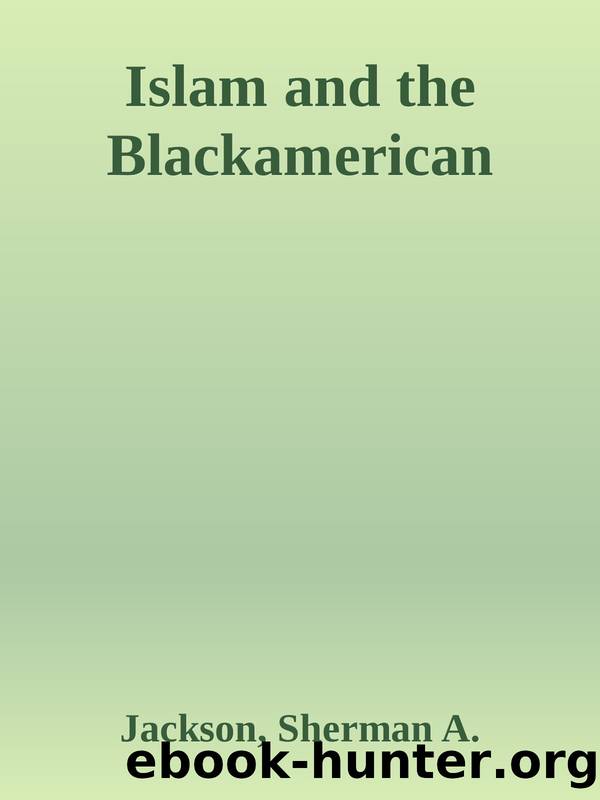Islam and the Blackamerican by Jackson Sherman A

Author:Jackson, Sherman A.
Language: eng
Format: epub
Published: 2015-07-31T04:04:12+00:00
None of this, however, can support the Black Orientalist contention that Islam or the Muslim world provided the example on which âthe enduring wrong conduct of the American nationâ was modeled. Indeed, the Muslim
b l a c k o r i e n t a l i s m
129
world had itself been the victim of âenduring wrong conduct,â going back precisely to the period that produced the American immigration law of 1790.
Napolean landed in Egypt in 1798; the British began their defacto rule of (then Mogul) India in 1772. Immigrant Muslims may have evinced (and may continue to evince) a lack of moral energy in failing to oppose American white supremacyâand few who have benefited from the system have. But to point to Islam, Muslims, and the Muslim world as subjects rather than objects of this arrangement is truly to point to the elephant while only cursing its shadow.
Blackamerican Islam developed in the context of Americaâs E pluribus duo, according to which blackness was devalued, as a social, cultural, and political pollutant. From the very beginning, opposition to white supremacy informed the understanding of virtually every Blackamerican Muslim movement in America, from the proto-Islamic to the Islamic, from Noble Drew Ali and the Honorable Elijah Muhammad through Malcolm X, Ima¯m Wa¯rithuddı¯n Muhammad and Ima¯m Jamı¯l al-Amı¯n. It is difficult, in this light, to go along with the Black Orientalist insinuation that it is Islam that threatens the integrity of American blackness, that blackness would be somehow less devalued were it not for the presence of Muslims, or that Muslims rather than the sponsors of E pluribus duo are the greatest impediment to racial reconciliation in America.
It is true that from the time of the Third Resurrection and the shift in the basis of Islamic religious authority, Blackamerican Muslims have experienced great difficulty in addressing American reality on the basis of the super-tradition of Islam. Given the esteem in which Blackamericans had generally held Islam theretofore and the hopes and expectations that went along with this, this inability has bred a natural disappointment among non-Muslim Blackamericans. But the shortcomings of Blackamerican Muslims should not be abused and cast as some sort of willful betrayal or scripturally mandated neglect. It took upwards of a century and a half for Blackamerican Christians to find in Black Theology a way to âChristianizeâ the agenda of Black Religion so that they could pursue their aspirations for a dignified American existence not simply as blacks but as Christians. Blackamerican Muslims will have to pass through a similar evolution en route to finding ways to reconcile blackness, Americanness, and Islam. Moreover, as in the attempt of their Christian predecessors, they will have to execute this in a manner that neither reduces their religion to a cultural performance nor converts it into just another secular ideology in religious garb. Without question, this is the challenge facing Blackamerican Muslims in the Third Resurrection. This will be the subject of the next two chapters.
This page intentionally left blank
Download
This site does not store any files on its server. We only index and link to content provided by other sites. Please contact the content providers to delete copyright contents if any and email us, we'll remove relevant links or contents immediately.
| Anthropology | Archaeology |
| Philosophy | Politics & Government |
| Social Sciences | Sociology |
| Women's Studies |
Cecilia; Or, Memoirs of an Heiress — Volume 1 by Fanny Burney(32544)
Cecilia; Or, Memoirs of an Heiress — Volume 2 by Fanny Burney(31942)
Cecilia; Or, Memoirs of an Heiress — Volume 3 by Fanny Burney(31929)
The Great Music City by Andrea Baker(31916)
We're Going to Need More Wine by Gabrielle Union(19034)
All the Missing Girls by Megan Miranda(15946)
Pimp by Iceberg Slim(14484)
Bombshells: Glamour Girls of a Lifetime by Sullivan Steve(14052)
For the Love of Europe by Rick Steves(13899)
Talking to Strangers by Malcolm Gladwell(13346)
Norse Mythology by Gaiman Neil(13345)
Fifty Shades Freed by E L James(13232)
Mindhunter: Inside the FBI's Elite Serial Crime Unit by John E. Douglas & Mark Olshaker(9318)
Crazy Rich Asians by Kevin Kwan(9277)
The Lost Art of Listening by Michael P. Nichols(7490)
Enlightenment Now: The Case for Reason, Science, Humanism, and Progress by Steven Pinker(7306)
The Four Agreements by Don Miguel Ruiz(6744)
Bad Blood by John Carreyrou(6611)
Weapons of Math Destruction by Cathy O'Neil(6264)
